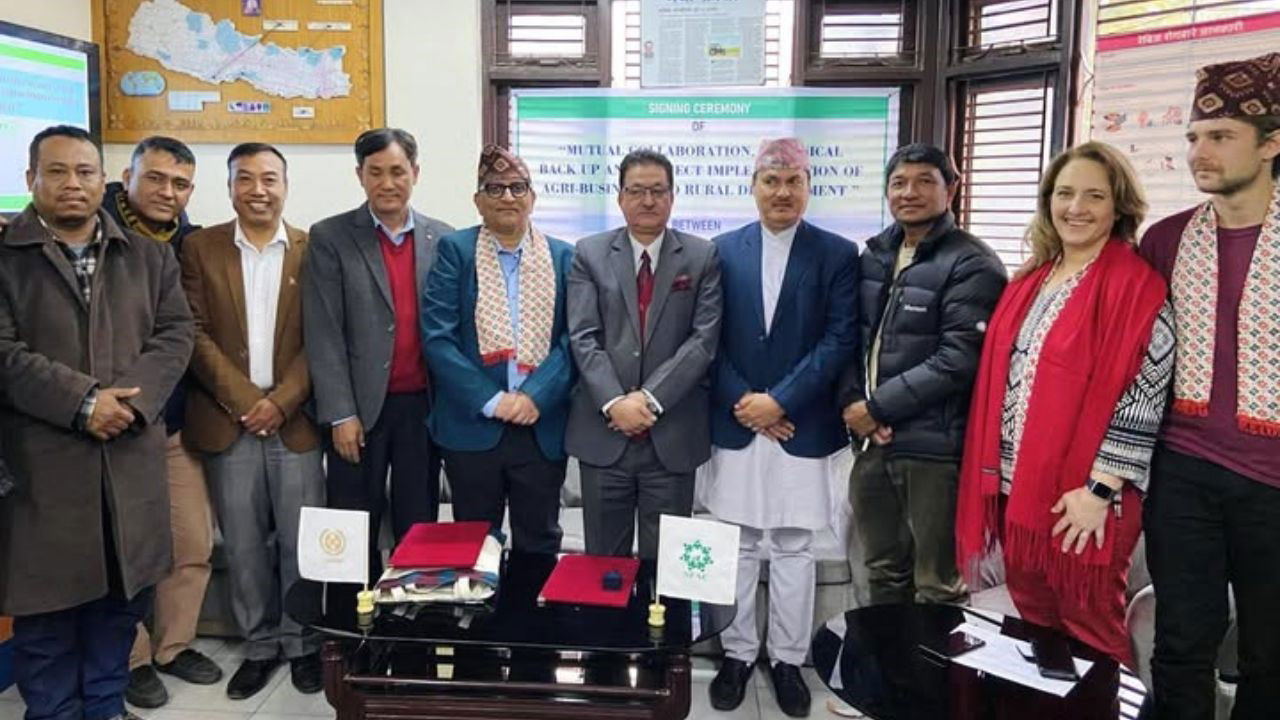
The Centre on Integrated Rural Development for Asia and the Pacific (CIRDAP) and Nepal Farmers Advisory Council (NFAC) Pvt. Ltd. have signed a Memorandum of Understanding (MoU) on December 8, 2024, aimed at advancing agribusiness and rural development initiatives in Nepal. The agreement was formalized by Dr. P. Chandra Shekara, Director General of CIRDAP, and Dr. Yogendra Kumar Karki, Chairman of NFAC.
This five-year partnership focuses on enhancing technical support, capacity building, and promoting climate-smart agricultural practices. CIRDAP will facilitate international knowledge exchange, emphasizing climate-smart agriculture (CSA) and e-agriculture. NFAC, on the other hand, will collaborate with various levels of government in Nepal to ensure the effective rollout of projects and initiatives.
While discussing strategies for improving the agriculture sector, Dr. P. Chandra Shekara, Director General of CIRDAP, highlighted significant initiatives and shared his vision for transforming perceptions about farming. Dr. Shekara proudly mentioned the Memorandum of Understanding (MoU) signed with Krishi Jagran, India’s largest Agri Media Group. He noted, “Krishi Jagran connects with 1 million people daily and 230 million people monthly, publishing in 12 languages across 23 editions and covering 22 states of the country.”
Addressing misconceptions about poverty and agriculture, he said, “Agriculture is often associated with poverty, projecting farmers as the poorest segment of society. However, this is far from the truth. There are rich individuals in agriculture as well. The ‘Millionaire Farmer of India’ (MFOI) initiative by Krishi Jagran has been instrumental in identifying and recognizing progressive farmers, demonstrating that agriculture can be a lucrative profession.”
"There’s money in agriculture, and there are rich people in agriculture. Agriculture is not just an old man’s profession. An educated person can also pursue it and excel in it," he said. He further emphasized the need to shift the youth's perspective on agriculture, proposing a similar initiative, the ‘Millionaire Farmer of Nepal.’ This initiative, he explained, would encourage Nepalese youth to see agriculture as a viable and profitable career choice.
Dr. Shekara also stressed the need for collaboration among various stakeholders, including exporters, processors, scientists, and media professionals, stating, “Agriculture development is not limited to farmers alone. It involves the entire ecosystem, and media professionals play a vital role in driving awareness and progress.” On agribusiness, he remarked, “Agriculture can and should be converted into agribusiness. We are committed to supporting NFAC in this endeavor.” He also highlighted the importance of reducing agricultural wastage, both on-farm and off-farm, as a critical area of focus.
Dr. Shekara concluded by sharing the recent recognition of July 6 as World Rural Development Day by the United Nations. He celebrated this milestone, as it coincides with the founding day of CIRDAP, and acknowledged the organization’s contributions to rural development across the Asia-Pacific region.
The collaboration between CIRDAP and NFAC is expected to empower marginalized farmers in Nepal, foster sustainable agricultural practices, and integrate agribusiness into the broader rural development framework.
About CIRDAP
-
The Centre on Integrated Rural Development for Asia and the Pacific (CIRDAP) is a regional, inter-governmental, and autonomous institution established in 1979. It was created through the initiative of Asia-Pacific countries, supported by the Food and Agriculture Organization (FAO) of the United Nations and other UN organizations. CIRDAP's member countries include Afghanistan, Bangladesh (host), Fiji, India, Indonesia, Iran, Laos, Malaysia, Myanmar, Nepal, Pakistan, the Philippines, Sri Lanka, Thailand, and Vietnam.
-
CIRDAP’s primary objectives are to assist national actions, promote regional cooperation, and serve as a supporting institution for integrated rural development in its member countries. The Centre fosters technical cooperation through designated ministries and institutions in each member country, aiming to enhance the effectiveness of rural development programs across the Asia-Pacific region through research, training, and information dissemination.
















